Congress of the German Society for Parasitology in Berlin March 2018
The bi-annual meeting of the German Society for Parasitology took place this year in Berlin, from March 21.-23.
Our project was represented by three talks and two posters.
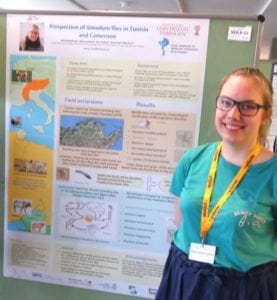
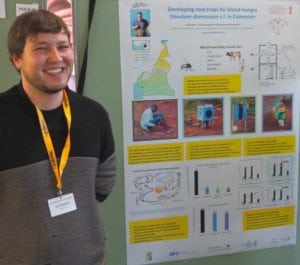
The bi-annual meeting of the German Society for Parasitology took place this year in Berlin, from March 21.-23.
Our project was represented by three talks and two posters.


At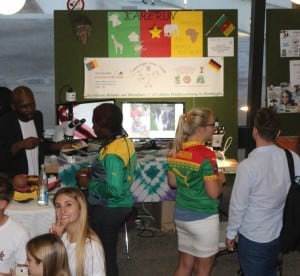
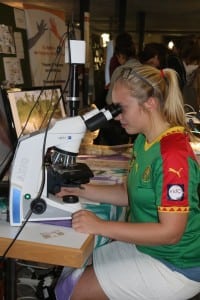
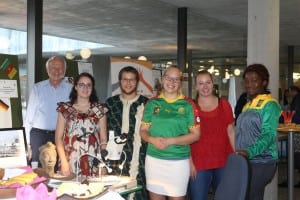 the beginning of the Wintersemester, a presentation of the various activities at the university is given in the foyer of the Hörsaalzentrum on the Morgenstelle. We presented parasites and vectors under the microscope and informed about the various possibilities to work in Cameroon.
the beginning of the Wintersemester, a presentation of the various activities at the university is given in the foyer of the Hörsaalzentrum on the Morgenstelle. We presented parasites and vectors under the microscope and informed about the various possibilities to work in Cameroon.
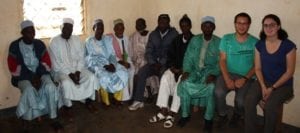 In August 2017, two Tübingen Bachelor-students, Dorothee Gabler and Patrick Weiss, went to Cameroon to collect data for their theses. Patrick aims to focus on filarial parasites in domestic animals, others than cattle and to examine whether there are filarial species, that live in both cattle and other (small) ruminants.
In August 2017, two Tübingen Bachelor-students, Dorothee Gabler and Patrick Weiss, went to Cameroon to collect data for their theses. Patrick aims to focus on filarial parasites in domestic animals, others than cattle and to examine whether there are filarial species, that live in both cattle and other (small) ruminants.
Dorothee wants to study the survival of Simulium flies, that fed on cattle, either treated with acrarides and/or antiparasite drugs (trypanocides or ivermectin). The aim of Dorothee’s work is to understand why the Annual Biting Rates of Simulium damnosum have decline so much during the past 5 years.
From July 31st to August 12, a workshop on methods of medical entomology is going on.
4 Cameroonian students and young professionals attended this course at the Institute of Evolution and Ecology. Together with 7 German counterparts, they focussed on ticks, Simulium black-flies, tabanid and tsetse flies, that are vectors of African diseases of cattle and man. Molecular identification tools, together with classical microscopical techniques were used to identify vectors and parasites.
Dr. Albert Eisenbarth together with Babette Abanda introduced into the molecular methods at the Department of Comparative Zoology, where the experiments were carried out. From Ixodes ticks, collected in the Schönbuch forest, the students isolated DNA, amplified it with specific primers for bacteria and were thus able to identify Borrelia infestations in one of 7 ticks. A prevalence of 15 % of Borrelia is not unusual for this biotope, but recalls the risks of visiting the Schönbuch.
Excursions led to the Hohenzollern castle and the Atomic cellar in Haigerloch – spectacular sites of history and science.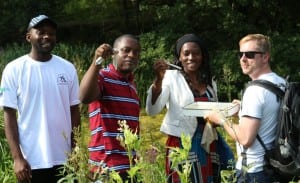
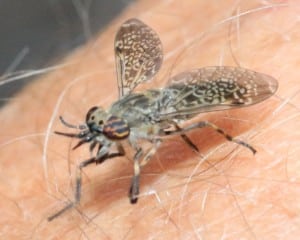
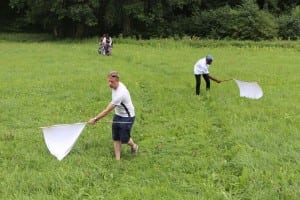
“The open-minded discussions helped us to better understand the field-work we are carrying out in Cameroon. For example ticks may be potential vectors of trypanosomes” Claudine Henriette Sen Ngomtcho said.
The sad news is that there shall be no Afrika-Festival in Tübingen this year! Instead, Dr. Albert Eisenbarth and Babette Abanda went to Würzburg to present our project there.
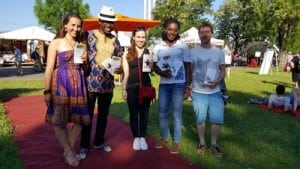
Please read their report: Read more
16 students attend the course on vectorbiology and epidemiology in the summer-term 2017. Teaching includes the results of the on-going epidemiological work in Cameroon.
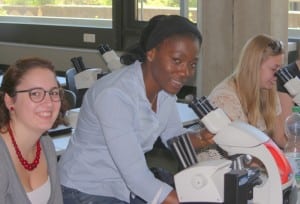
students of vectorbiology and epidemiology 2017
Some of the participants of this course would like to do their practicals in the fieldstation in Cameroon. MSc Babette Guimbang Abanda is overseeing the students dissecting Simulium damnosum flies from Cameroon. Some filarial larvar were found.
This year, the Tübinger Fenster der Forschung took place on the 28th of April. Research projects at the University of Tübingen presented their activities in research and teaching.
http://www.uni-tuebingen.de/tuefff
More than 100 projects were present in the Hörsaalzentrum on the Campus Morgenstelle. Also Programme Onchocercoses, see pictures.
Our presentation of the field-work in Cameroon highlighted the possibilities of German-Cameroonian collaboration and exchange of students in biology, parasitology and entomology. The Baden-Württemberg Stiftung is supporting this international collaboration and provides grants for visiting students and scientists.
Many students and colleagues came to visit our stand, also Prof. Engler, the rector of the university and Prof. Rosenstiel, the dean of our faculty. Under two microscopes, parasites and vectors could be seen and Cameroonian fruits, coffee and chocolate could be tested – without any parasites, for sure!
Dr. Albert Eisenbarth, MSc Babette Abanda, MSc Archille Paguem and stud. biol. Felicia Trossmann took care of explaining the purpose of our work to the visitors.
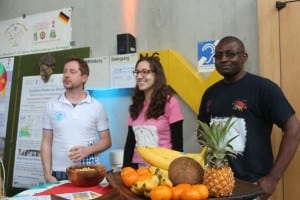
Tübinger Fenster der Forschung 2017
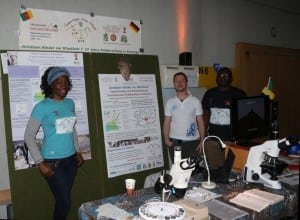
Tübinger Fenster der Forschung 2017
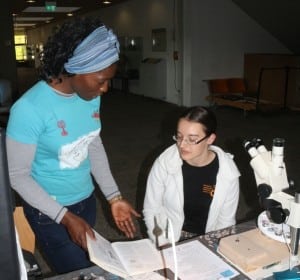
Tübinger Fenster der Forschung 2017
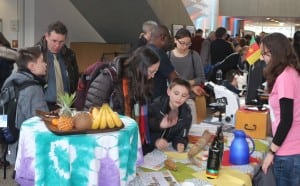
Tübinger Fenster der Forschung 2017
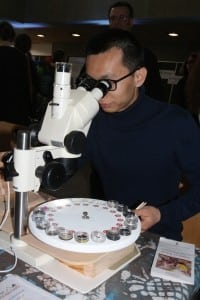
Tübinger Fenster der Forschung 2017 – visitor
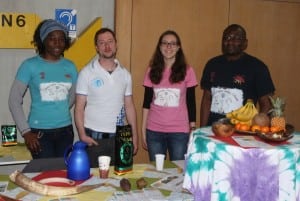
Tübinger Fenster der Forschung 2017 Babette Abanda, Albert Eisenbarth, Felicia Trossmann, Archille Paguem
Programme Onchocercoses has been invited to take part in the 2017 Festival of the ISNTD on February 23rd in the Barbican-Centre in London.
=> for festival, see http://isntdfestival.com/showcase/4592561605
for programme, see http://isntdfestival.com/programme/4593247637
This talk shall summarize the past 50 years of research on riverblindness in Cameroon, from the heroic times of Drs Duke, Anderson and Fuglsang, to the first ivermectin-mass-treatments that started in 1987 and to the actual situation, which is characterized by a striking decrease of both vector biting rates (this was unexpected!), transmission and Onchocerca infections. Ivermectin, socio-economic development of the rural villages and zooprophylaxis by cattle have contributed to this success.
Onchocerciasis has been called to affect the people ‘living at the end of the road’. Therefore, rural development is a key-factor for control. From the organisation of community-organized distribution of Ivermectin by local health-workers, to changes in the way of life and clothing, which reduces the contact to the Simulium vector flies. Cattle, being an ideal proxy for the human blood-host, can beneficially interfere in many ways: Diverting blood-searching flies by zooprophylaxis and providing a significant degree of premunition by cross-transmission of the bovine parasite, Onchocerca ochengi.
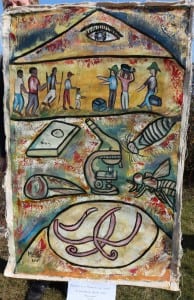
Painting by artist Must from Ngaoundéré
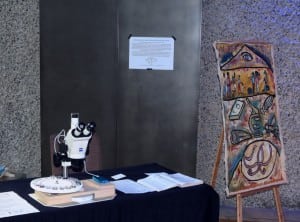
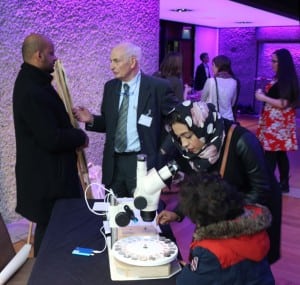
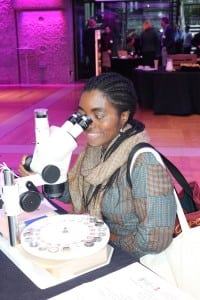
Eight students and parasitologists from Cameroon and one from Tunisia came to Tübingen to participate in this workshop, together with German students. For two weeks, they concentrated on combining the classical techniques of medical entomology and parasitology with the methods of molecular genetic identification of vectors and pathogens.
The participants are biologists, doctors of veterinary medicine and postgraduate students from the Cameroonian universities of Ngaoundéré and Buea, from the regional centers of the Institut de Recherches Agronomiques pour le Developpement (IRAD) de Bambui et Wakwa and from the Ecôle véterinaire de l’université de Tunis.
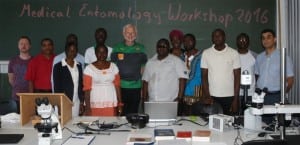
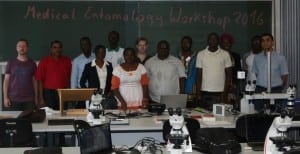 Participants of the workshop
Participants of the workshop
From Thursday morning till Sunday evening, the Afrika-Festival Tübingen 2016 shall take place on the Festplatz in Tübingen. Like every year, we are present in a pavillon, where we inform about our research activities in Cameroon.
Particular topics of this year’s festival are the scientific collaboration & research.
Mor information on the festival is available at:
http://www.afrikafestival.net/de/
Our last year’s presentatation can be found at:
https://www.riverblindness.eu/programme-onchocercoses-at-afrika-festival-tubingen-2015/
and a report about our scientific co-operation and research under:
http://www.afrikafestival.net/images/Jahresbericht/AfrikAktiv_Jahresbericht_2015.pdf => pages 16 ff!
We are looking forward to this meeting – the temperatures are already Africa-like hot.
And we would be very pleased meeting you there in our pavillon, close to the entrance of the festival-site.
We may request cookies to be set on your device. We use cookies to let us know when you visit our websites, how you interact with us, to enrich your user experience, and to customize your relationship with our website.
Click on the different category headings to find out more. You can also change some of your preferences. Note that blocking some types of cookies may impact your experience on our websites and the services we are able to offer.
These cookies are strictly necessary to provide you with services available through our website and to use some of its features.
Because these cookies are strictly necessary to deliver the website, refusing them will have impact how our site functions. You always can block or delete cookies by changing your browser settings and force blocking all cookies on this website. But this will always prompt you to accept/refuse cookies when revisiting our site.
We fully respect if you want to refuse cookies but to avoid asking you again and again kindly allow us to store a cookie for that. You are free to opt out any time or opt in for other cookies to get a better experience. If you refuse cookies we will remove all set cookies in our domain.
We provide you with a list of stored cookies on your computer in our domain so you can check what we stored. Due to security reasons we are not able to show or modify cookies from other domains. You can check these in your browser security settings.
These cookies collect information that is used either in aggregate form to help us understand how our website is being used or how effective our marketing campaigns are, or to help us customize our website and application for you in order to enhance your experience.
If you do not want that we track your visit to our site you can disable tracking in your browser here:
We also use different external services like Google Webfonts, Google Maps, and external Video providers. Since these providers may collect personal data like your IP address we allow you to block them here. Please be aware that this might heavily reduce the functionality and appearance of our site. Changes will take effect once you reload the page.
Google Webfont Settings:
Google Map Settings:
Google reCaptcha Settings:
Vimeo and Youtube video embeds:
The following cookies are also needed - You can choose if you want to allow them:
